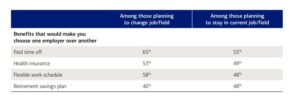Young adults rank health insurance as one of the top benefits that need to be in place before they would consider accepting a new job, according to Georgetown University research.
Workplace wellness and stress support benefits were also cited as a vital compenet of employer offerings.
For young adults paid time off (PTO) was the most persuasive workplace benefit in deciding whether to move to another employer, followed by health insurance, flexible work and retirement plans.
However, for those planning to change jobs in the next year, PTO and flexible work schedules weighed most heavily in their choice of an employer, with 65% and 58% saying so respectively.
Emotional and mental health benefits
The Young Adults and Workplace Wellness Survey, conducted in partnership with Bank of America, examined the attitudes and priorities of 1,032 employees aged 24 to 35 as they return to work in person following the pandemic.
While social, emotional, mental health and tuition support benefits fall further down the list of benefits that impact their choice, they weigh more heavily in young adults looking to change jobs (29% and 26%, respectively) than for young adults who were planning to remain with their employer (18% each).
Those actively looking to change job or fields cited paid time off (65%) and a flexible work schedule (58%) among the top benefits impacting their choice of an employer.
In addition, 73% of young adults wanted benefits that can travel with them if they change jobs.
“In the post-pandemic era for the workplace – with people returning to the office, hybrid work environments, and desires for greater work-life balance – employers need to adapt quickly,” said Kevin Crain, head of retirement research and insights at Bank of America.
“To be an employer of choice to attract and retain young adult workers, employers need to take greater responsibility for their employees’ overall wellness by offering new benefits and encouraging utilization of existing benefits.”
Almost half (46%) of young adults indicate that they find it difficult to manage the stress of work and other things going on in their life (15% strongly agree).

The young adults also rated workplace wellness benefits that support stress management and work-life balance as the ones they’d most like to see from their employer.
These benefits included paid sick leave (42%), unlimited PTO (35%), flexible work/work from home schedules (34%) and paid parental leave (25% overall; 31% among young adult parents).
Mental health resource was identified by 30% of young adults (40% of those with work-related stress) as a key wellness benefit and was the only non-PTO or flexible work benefit to make the top 10 most desired wellness benefits.
Financial wellness in the form of debt management assistance, including student loan payment, was identified by 22% of young adults and 33% of young adults with outstanding debt as a desired benefit.
“It’s our responsibility as leaders in business to understand the changing nature of work so that we can build a future that enables current and future generations to thrive,” said Paul Almeida, dean and William R. Berkley Chair at Georgetown’s McDonough School of Business.
“We believe business can be the greatest force for good in the world – and that starts by looking inward at our employees, our students, and our stakeholders.
“When we create a culture of wellness and care for others, we enable our best and brightest to succeed personally and professionally.”






